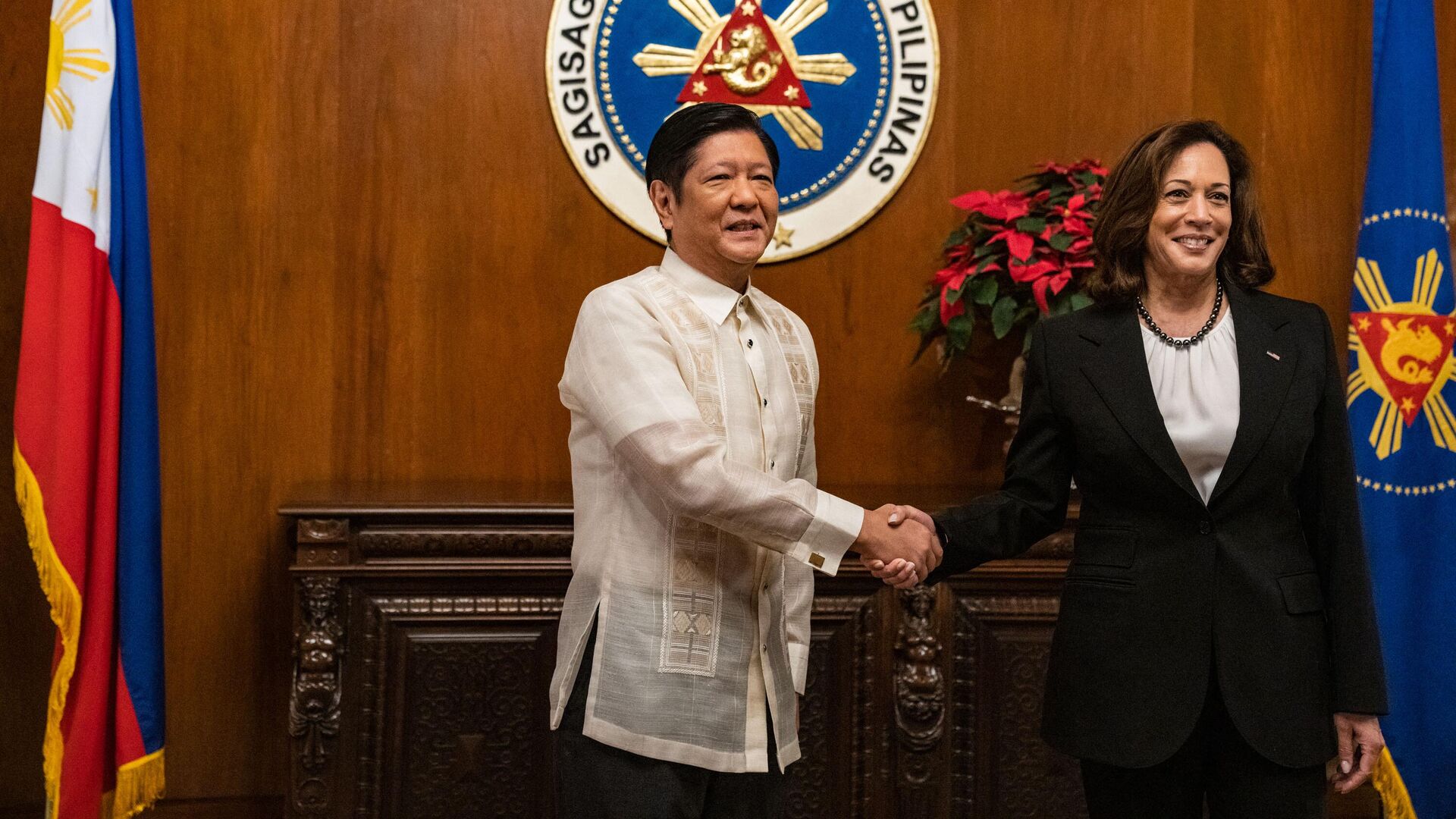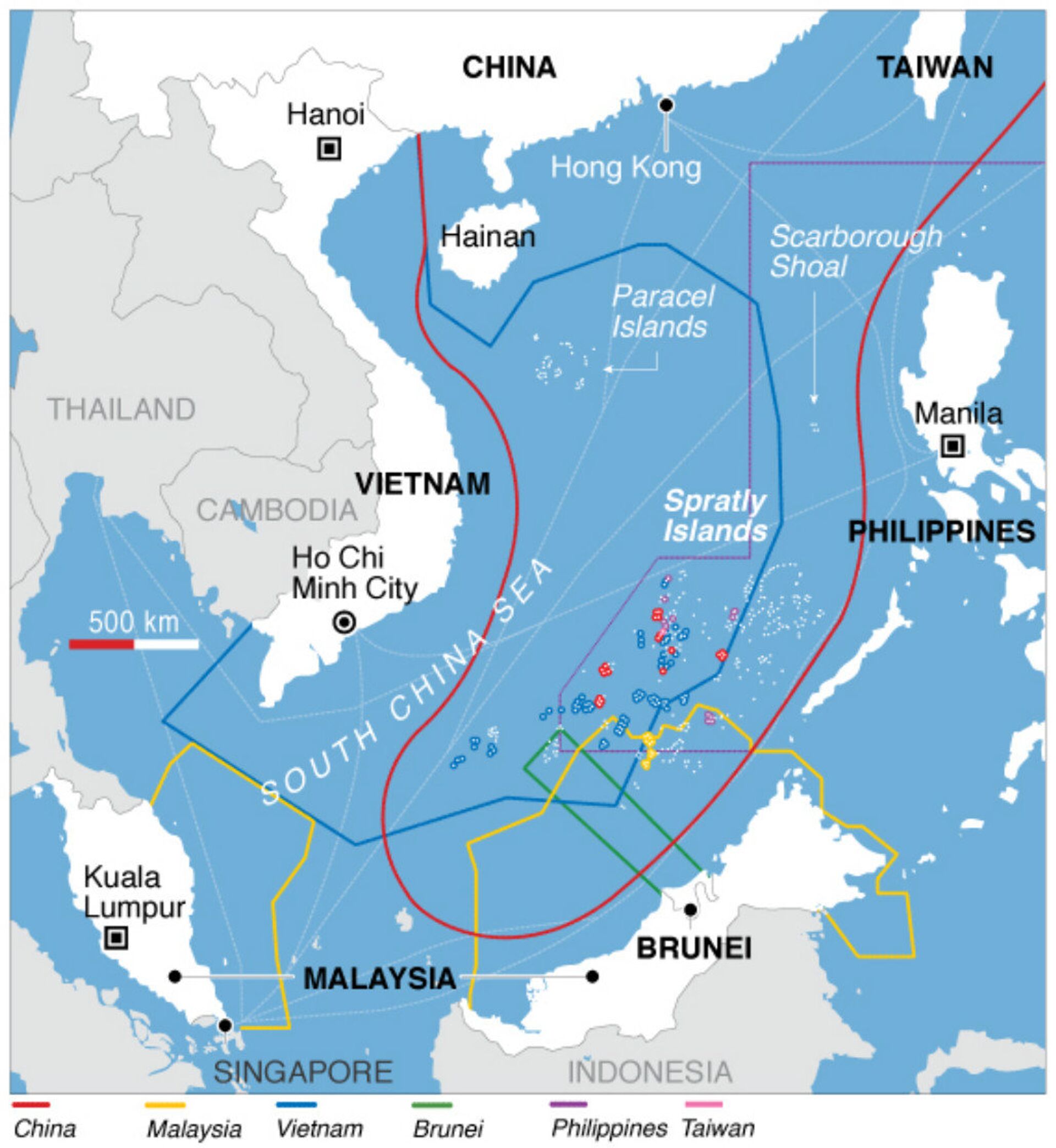https://sputnikglobe.com/20221121/harris-tells-marcos-south-china-sea-armed-attack-on-philippine-forces-would-trigger-defense-pact-1104513787.html
Harris Tells Marcos South China Sea ‘Armed Attack’ on Philippine Forces Would Trigger Defense Pact
Harris Tells Marcos South China Sea ‘Armed Attack’ on Philippine Forces Would Trigger Defense Pact
Sputnik International
US Vice President Kamala Harris met with Philippine President Ferdinand Marcos, Jr. on Monday, part of an effort to shore up US support in Southeast Asia amid... 21.11.2022, Sputnik International
2022-11-21T18:38+0000
2022-11-21T18:38+0000
2022-11-21T18:39+0000
world
philippines
south china sea
kamala harris
https://cdn1.img.sputnikglobe.com/img/07e6/0b/15/1104513616_0:312:3000:2000_1920x0_80_0_0_ae48e984e5e13051c7b07f697afa76cd.jpg
“We stand with you in defense of international rules and norms as it relates to the South China Sea,” Harris told Marcos on the western island of Palawan. “An armed attack on Philippine armed forces, vessels or aircrafts in the South China Sea would invoke US mutual defense commitments.”Then-Philippine Defense Minister Delfin Lorenzana told Filipino media in 2019 that the American interpretation of the MDT was that it only covered the “metropolitan Philippines,” a definition based on the territory Spain surrendered to the US at the end of the Spanish-American War in 1898. Marcos’ father, right-wing dictator Ferdinand Marcos, first claimed the islands were part of Palawan Province in 1974.Three other nations also have claims over the tiny islands in the South China Sea - Malaysia, Brunei and Vietnam - as well as Taiwan, an autonomous island at the northern end of the waterway that Beijing claims as a rebellious province. The waterway handles some $5 trillion annually in trade, and the seafloor surrounding the islands is believed to be rich in petroleum deposits, in addition to their strategic value.Also on Monday, the Philippine navy accused China of seizing a piece of a Chinese rocket that was being towed by a Philippine naval boat after recovering the object in international waters. However, the Chinese side said the object was surrendered without a struggle.The US has looked to use the territorial disputes to drive a wedge between China and the Southeast Asian states, which have increased their trade volume and infrastructural integration with China in recent years. A National Defense Strategy document recently published by the Pentagon identified Beijing as the US’ primary strategic rival, and emphasized the need to support regional powers against what it called China’s “increasingly coercive actions to reshape the Indo-Pacific region and the international system to fit its authoritarian preferences.”However, Beijing has worked to emphasize its equal standing with partner nations in its bilateral and multilateral reactions. At the Asia-Pacific Economic Cooperation (APEC) summit in Bangkok, Thailand, two days before the Harris-Marcos meeting, Chinese President Xi Jinping said Beijing would “open its door wider” to regional integration, not close the door or hesitate.Harris also met with Xi in Bangkok, where she reiterated what US President Joe Biden said at the G20 summit in Bali a week earlier: “we must maintain open lines of communication to responsibly manage the competition between our countries.”
south china sea
Sputnik International
feedback@sputniknews.com
+74956456601
MIA „Rosiya Segodnya“
2022
News
en_EN
Sputnik International
feedback@sputniknews.com
+74956456601
MIA „Rosiya Segodnya“
Sputnik International
feedback@sputniknews.com
+74956456601
MIA „Rosiya Segodnya“
philippines, south china sea, kamala harris
philippines, south china sea, kamala harris
Harris Tells Marcos South China Sea ‘Armed Attack’ on Philippine Forces Would Trigger Defense Pact
18:38 GMT 21.11.2022 (Updated: 18:39 GMT 21.11.2022) US Vice President Kamala Harris met with Philippine President Ferdinand Marcos, Jr. on Monday, part of an effort to shore up US support in Southeast Asia amid its ongoing efforts to hem in China.
“We stand with you in defense of international rules and norms as it relates to the South China Sea,” Harris told Marcos on the
western island of Palawan. “An armed attack on Philippine armed forces, vessels or aircrafts in the South China Sea would invoke US mutual defense commitments.”
Harris’ statement pushes up against existing interpretations of the 1951 Mutual Defense Treaty between the US and the Philippines. In 2019, the government of Marcos’ predecessor, Rodrigo Duterte, pushed to renegotiate the MDT to include the Kalayaan Island Group, a part of the Spratly Island chain that Manila claims.
Then-Philippine Defense Minister Delfin Lorenzana told Filipino media in 2019 that the American interpretation of the MDT was that it only covered the “metropolitan Philippines,” a definition based on the territory Spain surrendered to the US at the end of the Spanish-American War in 1898. Marcos’ father, right-wing dictator Ferdinand Marcos,
first claimed the islands were part of Palawan Province in 1974.
Marcos told Harris on Monday: “I do not see a future for the Philippines that does not include the United States.” The Philippines has maintained a close relationship with the United States since being granted independence in 1946, after nearly half a century of American colonial rule.
Three other nations also have
claims over the tiny islands in the South China Sea - Malaysia, Brunei and Vietnam - as well as Taiwan, an autonomous island at the northern end of the waterway that Beijing claims as a rebellious province. The waterway handles some $5 trillion annually in trade, and the seafloor surrounding the islands is believed to be rich in petroleum deposits, in addition to their strategic value.
Also on Monday, the Philippine navy accused China of seizing a piece of a Chinese rocket that was being towed by a Philippine naval boat after recovering the object in international waters. However, the Chinese side said the object was surrendered without a struggle.
“The Philippine side salvaged and towed the object first. After friendly consultation at the site, the Philippine side returned the object to China, and China expressed appreciation for that,” said Mao Ning, a spokesperson for the Chinese People’s Liberation Army. “There was no such thing as interception or forcible seizure at the scene.”
The US has looked to use the territorial disputes to drive a wedge between China and the Southeast Asian states, which have increased their trade volume and infrastructural integration with China in recent years.
A National Defense Strategy document recently published by the Pentagon identified Beijing as the US’ primary strategic rival, and emphasized the need to support regional powers against what it called China’s “increasingly coercive actions to reshape the Indo-Pacific region and the international system to fit its authoritarian preferences.”
When asked about Harris’ visit to Palawan, Chinese Foreign Ministry spokesperson Mao Ning told reporters: “We are not against the US’s interaction with regional countries. But it should be good for regional peace and stability and not damaging to other countries’ interests.”
However, Beijing has worked to emphasize its equal standing with partner nations in its bilateral and multilateral reactions. At the Asia-Pacific Economic Cooperation (APEC) summit in Bangkok, Thailand, two days before the Harris-Marcos meeting, Chinese President Xi Jinping said Beijing would “open its door wider” to regional integration, not close the door or hesitate.
Xi also spoke with Marcos at the summit, with the Philippine leader reportedly pledging that his nation would not “choose sides” in diplomacy and would jointly “resist unilateralism and bullying acts,” according to a Chinese readout of the meeting. The Philippine readout did not mention the exchange, but noted they discussed plans for Marcos’ state visit to China in January.
Harris also met with Xi in Bangkok, where she reiterated what US President Joe Biden said at the G20 summit in Bali a week earlier: “we must maintain open lines of communication to responsibly manage the competition between our countries.”





